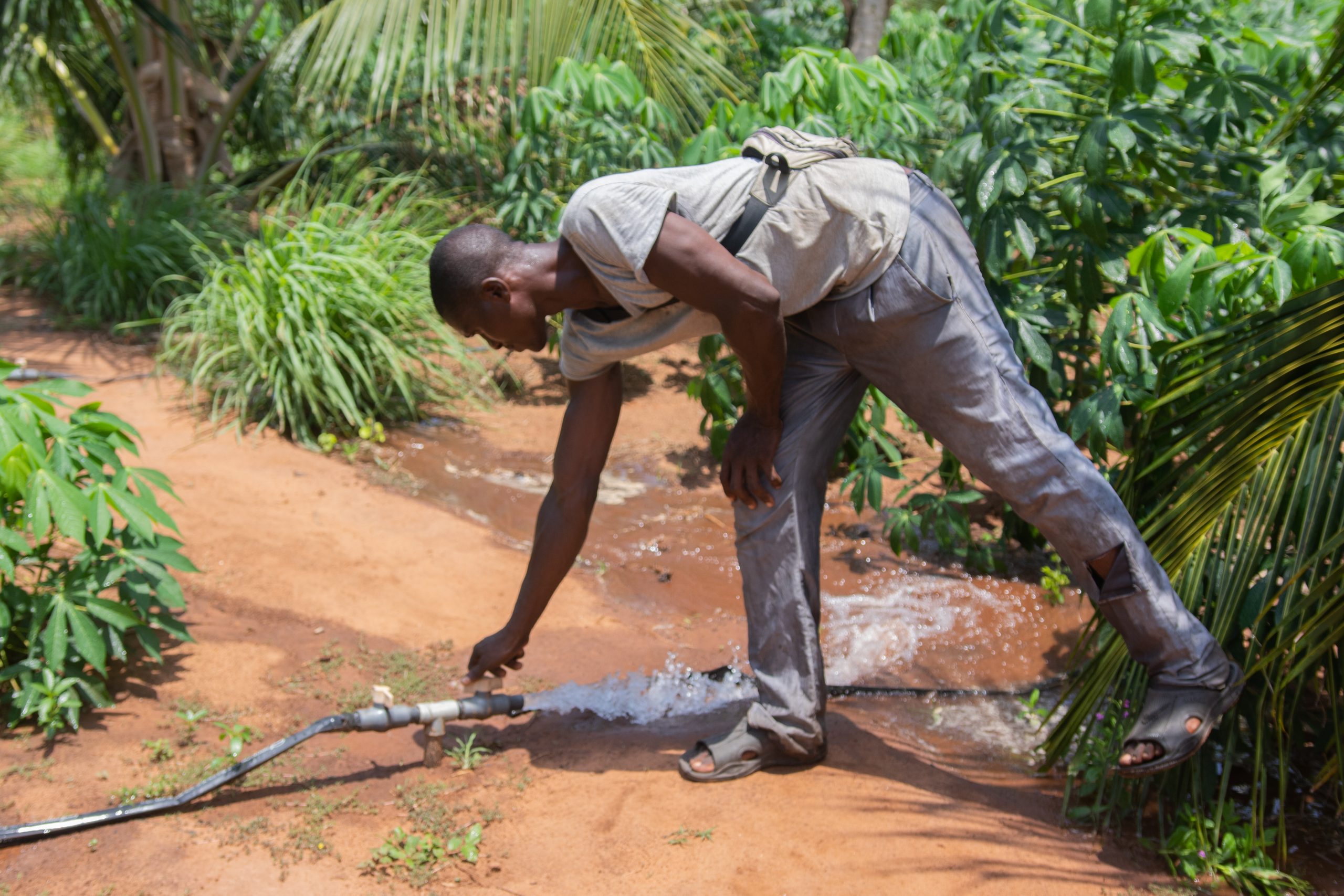Cross-sectoral partnerships are becoming more important in international development cooperation. With their financial independence and thematic expertise, private foundations and philanthropic organisations are excellent partners for public development cooperation in achieving the Agenda 2030.
One public enterprise that cooperates with the philanthropic sector is the Deutsche Gesellschaft für Internationale Zusammenarbeit (GIZ) GmbH. GIZ is implementing development projects for the German government, especially the Federal Ministry for Economic Cooperation and Development, and other public and private partners in around 120 countries. As a globally operating implementer with a wide network, GIZ’s cooperation with foundations is multifaceted: ranging from co-financing and direct commissioning to informal exchange.
But how do such partnerships improve the quality and impact of projects, and therefore contribute essentially to achieving the Sustainable Development Goals (SDGs)? A great showcase example is the current cooperation between the IKEA Foundation and Energising Development (EnDev).
EnDev, jointly coordinated by GIZ and the Netherlands Enterprise Agency (RVO), is a strategic partnership that provides access to renewable electricity and clean cooking for households, enterprises and social institutions in more than 20 countries worldwide. The multi-donor partnership is currently funded by Germany, the Netherlands, Norway, Switzerland – and the IKEA Foundation, as an independent philanthropy focused on creating brighter lives on a liveable planet through its grant-giving efforts.
The IKEA Foundation-funded project part ‘Sustainable Energy for Smallholder Farmers’ (SEFFA) supports the productive use of energy in dairy and horticulture value chains. Since 2021, innovative, scalable business cases are being piloted in Ethiopia, Kenya, and Uganda to increase the adoption of solar-powered productive use technologies for irrigation, cooling, and drying of agricultural goods. For this renewable energy initiative, the IKEA Foundation provided a grant of €8 million. Selected implementing organisations are involved at the country level – with Netherlands-based SNV among the most prominent partners.
We talked to Jolanda van Ginkel (Programme Manager, Renewable Energy at the IKEA Foundation) and Daniel Busche (Programme Director, EnDev, GIZ) about the cooperation.

Photo credit: Osia Zannou/Benin Drone Lab
GIZ: What are your reasons for working together with partners? And why do EnDev and IKEA Foundation make a good match?
Jolanda van Ginkel: At the IKEA Foundation, we believe that energy is a catalyst for development and that it can help families afford a better life, while protecting the planet. Therefore, we support collaborations between our partners and focus on transforming systems, businesses, and governments where our investments create a domino effect. That means, we look for opportunities where a relatively small amount of money can test innovations or change large, complex systems to reduce greenhouse gas emissions and to ultimately benefit the communities we support.
EnDev and the IKEA Foundation make a good match as GIZ has more than fifty years of experience in international cooperation. EnDev was already known to us as the world’s largest technical assistance programme for energy access. This fitted perfectly with our renewable energy strategy, where we focus on increasing access to and ‘productive use’ of renewable energy by investing in projects that enable people and their communities to improve their livelihoods, education and healthcare. And the impact of this work will be important for the work of our other partners, helping to achieve SDG7 together.
Daniel Busche: EnDev seeks to play a pivotal role in contributing to energy sector transitions worldwide. Delivering on SDG7 calls for joint action, so it is part of EnDev’s DNA to team up with partners. This team approach is a key success factor of EnDev’s track record and can be observed at all levels. The fact that EnDev has reached almost 26 million people and that our activities are achieving CO2 savings of 2.6 million tonnes per year is due to long-term collaboration with donors and co-financiers, as well as with partners on the ground, based on trust and transparency.
Especially in rural areas, EnDev aims at unleashing economic opportunities by creating markets for renewable energy, while ensuring that no one is left behind. That is exactly where IKEA Foundation and EnDev meet. The engagement of the IKEA Foundation, with its strong focus on entrepreneurial aspects and particularly on women and young people, provides a welcome opportunity to test new approaches and contribute to broader learning in the sector.
Your initiative, implemented in three East African countries, is benefitting smallholder farmers and their resilience to climate change. What have been or may be some of the challenges you might face in this project?
Daniel Busche: Farmers in Ethiopia, Kenya and Uganda often use expensive and harmful energy sources. The market is still in an early stage with limited availability of quality productive use technologies. This barrier will be addressed by the project through supporting innovative ideas for milk/vegetable cooling and fruit/vegetable drying, as well as solar-powered irrigation. The objective is to improve agricultural production efficiency, reduce energy expenditures and improve durability of goods – all based on climate-friendly technologies. The partnership with the IKEA Foundation also specifically aims to empower women and young people.
Jolanda van Ginkel: Indeed, there is a lot of talent and ideas in communities in Ethiopia, Kenya and Uganda, but their solutions are often at an early stage. That is why an innovation fund is part of the programme. We focus on challenging regions whose economies are often still nascent and where enabling factors are not always present. Solutions in these regions are not always developed with the communities’ needs and interests in mind and often focus heavily on the supply side. There is now a tailor-made strategy in each of these countries that addresses these challenges.
Daniel Busche: What we find in all three countries is the lack of financial services. Smallholder farmers struggle to finance equipment and machines that can be powered with renewable energy. In addition, adoption of new business models tackling these challenges is limited – especially in Ethiopia. That’s where we come in.
Let´s talk about actual impact! What impact do you expect the project to have with regards to environmental issues in the project’s target countries?
Jolanda van Ginkel: EnDev has introduced innovative solutions for the productive use of renewable energy among smallholder farmers in the horticulture and dairy value chains in Ethiopia, Kenya and Uganda. Scalable and innovative business models will enable smallholder farmers and related local enterprises in agricultural value chains to increase their productivity, generate higher incomes and create better, climate resilient and food secure livelihoods. An important element of this programme is capacity building of local institutions and networks. In doing so, we aim to ensure local ownership and sustainable impact. At the end of the three-year project period, there will be a number of successful business models and innovations ready for expansion, replication and scaling.
Daniel Busche: Let me give you an example: In Kenya, many farmers use diesel generators to cool milk or run irrigation systems. You can imagine how unprofitable this is in the long run. We strive to demonstrate that solar-powered technologies are more sustainable in the long run, not only in economic terms, but also in environmental terms. Furthermore, the project aims to better preserve the harvest and thus contribute to the food security of thousands of people. But it is the economy that drives this change: Less waste means more income, and hard-working farmers can afford a better life. The project has the potential to increase a family’s income by up to 20% and help develop climate friendly, inclusive, and resilient communities.
Jolanda van Ginkel: Not to forget: While the implementation in Uganda, Kenya and Ethiopia is focused on sustainable change both socially and environmentally, the experience and knowledge will be shared with the entire sector. Of course, the key learnings from these business cases may and should be used by our partners. And beyond!
Looking at your partnership, which is still young: What would you say is the main benefit of collaboration between public development cooperation and philanthropy in the field of climate action? What is each one bringing to the table?
Jolanda van Ginkel: In my opinion and experience so far, EnDev has a wealth of experience and is well-grounded in local networks, working with local, experienced staff. IKEA Foundation with its philanthropic capital de-risks the programme by supporting early stage innovations, meaning for example trying new things, beyond what has been proven successful; new business cases can be tested. Viable approaches can be mainstreamed in EnDev. In other words: we can move more traditional funding into new approaches when we have proven the case being successful.
Daniel Busche: Energy is a precondition for development – and with SDG7, the international community has committed to achieve universal energy access. In cooperation with a philanthropic partner, EnDev brings in 15 years working on the ground directly improving the lives of millions of people. This is complemented in this case by the strong profile of the IKEA Foundation on strengthening local businesses, particularly empowering women and young people. Beyond implementation, the partnership opens up new avenues for professional exchange and joint learning. Bringing together the philanthropic and public networks of IKEA Foundation and EnDev bears the opportunity for maximising impact.
Isabella Lehmann is a communications manager. At EnDev, she strengthens the visibility of their diverse portfolio and showcases its work as a global inclusive energy access programme under the SDGs and Climate agendas, which is based on partnership. Anda Ruf is an Advisor for Philanthropy and Private Foundations at GIZ’s Liaison Office to the private sector.




Comments (1)